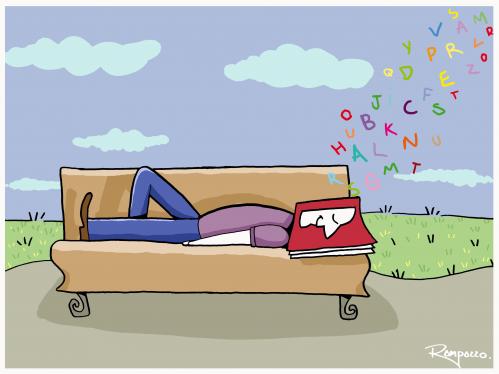Sunday, a day of leisure -- really???
 Spinning the plates
Spinning the plates
Nina directs music and liturgical ministries in a mid-size parish of approximately 1,600 families. With a bachelor's degree in music and a graduate degree in liturgy, Nina directs a volunteer department of over 150 volunteers who serve as choir members, cantors, instrumentalists and all lay liturgical ministers. Her music program includes four choirs (adult, youth, children and funeral choirs), an instrumental ensemble of string, wind, brass and percussion musicians and a fleet of cantors and leaders of song. Her liturgical ministers serve as readers, extraordinary ministers of Communion, leaders of Children's Liturgy of the Word, parish nurse ministry. Nina also teaches music approximately 20 hours a week in the parish elementary/middle school, provides music for all Sunday, holy days, weddings and funerals and all of the 'special' events that occur within parish life, including school liturgies.
Married to Dave, an tax accountant for a large law firm, Nina and Dave live with their three-year-old son Jamie and their eleventh-month-old daughter Isabelle in a suburb section of the city where Nina and Dave work. They discovered several weeks ago that Nina is pregnant with their third child.
Nina and Dave also care for her widowed father John, a retired teacher who suffers from chronic diabetes, heart disease and other medical conditions that require a special daily diet, medication management and frequent visits to his many physicians. John needs a ride when he has a doctor's appointment; he can no longer see well enough to drive himself. Nina and Dave alternate bringing John to his appointments in between bringing their children to the pediatrician for routine visits.
Between the many and unusual work hours of their individual jobs, the care of young children, the care of a sick, elderly parent and the daily maintenance that comes with regular household chores, "leisure" is not a word in Nina and Dave's vocabulary. They just "try to keep the plates spinning."
"There are days that we just go without sleep," Nina confesses. She laughs as she hands Isabelle a teething ring that escaped from tiny hands wet with drool, apple juice and soggy Cheerios. "I've actually slept in a sweat suit to be ready just to get up and get going without having to do much more than run a comb through my hair and wash my face. If someone's up at night (and that's pretty frequent between the kids and Dad), I've actually asked myself the next morning, 'Did I brush my teeth today?"
We talked about attempting to find balance and rest time within this happy but hectic household. "It's difficult," Dave admits. " With two afternoon Vigil Masses, an afternoon wedding with a possible funeral in the morning, and four liturgies on Sunday, including a Sunday night Mass for the Youth Group, weekends are just lost. Even evenings can be a challenge because of Nina's rehearsal schedule and her other responsibilities at work and school. I can work from home on weekends and we're lucky that I can do that but my regular work week averages between 60-70 hours a week. I try to be home by 6:30 pm so that Nina can get out of the house and be on time for whatever she's got going on at the parish and so I can be home for the kids and for John. It can get pretty dicey trying to keep all the plates spinning."
Nina nods and continues. "There are times when I've had to bring the kids to school when I teach or rehearsals and events in the parish because a babysitter cancels at the last minute and Dave is still at work. Palliative Care and Hospice volunteers do come to care for Dad but you need to set that up in advance. If one of the cards in the deck comes loose, the whole stack can come tumbling down pretty fast."
 In praise of leisure
In praise of leisure
In this week's New York Tiimes, Mark Oppenheimer commented on a particular section of the book "Pope Francis: His Life in His Own Words," which contains conversations with the former Cardinal Jorge Bergoglio. Oppenheimer's column zeroed in on the art of recovering leisure as a sacred necessity for the wellbeing of all people. One of the book's remarks caught my particular attention with regard to Sunday as a day of rest and part of the religious anthropology of Catholic tradition.
"More and more people work on Sundays as a consequence of the competitiveness imposed by a consumer society." In such cases, (Bergolio) concludes, "work ends up dehumanizing people."
The article continues that the whole of Sunday is supposed to matter beyond worship"owed to God, the joy proper to the Lord's Day, the performance of the works of mercy, and the appropriate relaxation of mind and body."
The comments echo a former papal voice, John Paul II and his letter Dies Domini (The Lord's Day), written to align with the church's year of Jubilee in 2000.
"The rediscovery of this day is a grace which we must implore, not only so that we may live the demands of faith to the full, but also so that we may respond concretely to the deepest human yearnings. Time given to Christ is never time lost, but is rather time gained, so that our relationships and indeed our whole life may become more profoundly human." (DD 7)
The final paragraph of Oppenheimer's column in the New York times alludes that pastoral ministers, lay and ordained do not always practice what they preach.
"Of course, those who preach a relaxing Sabbath, with friends and family, are often working hardest on the day they exalt." (Comment by Mark Oppenheimer)
 Coming up for air
Coming up for air
Pastors find themselves in a particular conundrum with regard to attention to the leisure of their lay pastoral staff. For example, the church acknowledges that music lives within the heart of each person. Beautiful music acts as a conduit of grace through the grace of God, the 'giver of song' (STTL 1) and acts as "an outward sign of God's love for us and of our love" (STTL 2) for God. People expect and access this sacred tune and text through its music ministers, their commitment and devotion and response to their calling. Natural outcomes result in talented individuals assuming positions as pastoral musicians, while others answer similar vocational calls as leaders of faith formation and liturgical ministers, both lay and ordained. The work is great and the pay is generally small to adequate. Charitable works finds their identity first in the body of its ecclesial ministers as a model of what life should look like as life in Christ.
So when do pastoral ministers come up for air? How do pastors encourage them to do so when so much of what happens on the Lord's Day depends on the work of a pastoral staff? For priests, deacons, pastoral musicians and all other ecclesial leaders, Sunday can be a difficult day to find time for leisure, as Pope Francis' comments suggest. In the case of Nina and Dave, finding time to rest presents them with tremendous challenges. Like all other pastoral ministers who work on Sunday, Nina rolls up her sleeves and goes to church at 8am, returns around 1:00 pm for a few hours and leaves again at 4:00 pm to rehearse the youth choir and minister music for the 5:00 pm evening liturgy.
College campus ministers begin their Sunday at 10:00am and go straight through 11:30 pm, when the last Mass ends. Add to that the work that must be done to prepare for the Lord's Day and while sustaining the community life of a parish or campus ministry with all that sacramental and faith formation entails.
When does a pastoral staff take a breath and come up for air?
Might there be a few ways to address the needs of a pastoral staff for a bit of well earned and necessary leisure by the communities that hard working pastoral ministers serve?
Works of mercy in mercy of the Body
Nina and Dave told me that when Nina delivered Isabelle, the parish choir pitched in and brought meals for two weeks that included food for John's special diet. Each evening at 5:00pm, a choir member appeared at their door with food that sustained the family for several weeks as Nina recovered from a Cesarean section delivery. "We had so much food that we were able to freeze some and use those meals when we really needed a break, " Dave told me. "What a lifesaver."
The smallest of deeds can measure the greatest love. Service occurs in the simplest ways when given with great love. This is our mission and call - to be at the service of one another "until it hurts" as Mother Teresa tells us. In this particular case, members of the faith community came to rescue of a member of the pastoral staff in a very human way - they fed her family.
Committed pastoral ministers serve us week after week, month after month and year after year, sometimes with little personal time to recover from a great deal of community service. Even an hour given of time given to a member of a pastoral staff offers them some necessary and much needed time off just to come up for air.
From comical to contemplative
"One day, an associate pastor from a parish called me with a question," Nina said. "I was holding Isabelle under one arm while I stirred a pot of soup with my other hand, trying to hear what this priest was saying while Jaime was dragging pots and pans from a cupboard and banging them with a spoon. My dad was buzzing me with a device that we installed in his room; he needed something. I had the phone cradled between my shoulder and my ear while I held the baby and lowered the heat under the burner before the soup boiled over. I answered the priest's question and then remembered an upcoming liturgy that we were both involved in the near future. So I asked him, "While I have you on the phone, can I ask you a question?"
"Oh no, I don't want to talk about anything else right now. It's my day off."
Nina laughed as she told me the story. "At first I was stunned and then was just angry. How did he dare say that to me?! Didn't this guy get it? And then I just stopped and laughed out loud. How in the world would he know what I was living through? He doesn't live it. He set boundaries for his own time out and stuck to his guns. He needed his time off."
Nina thought a minute before she added, "I must say that I do envy him that kind of freedom but then again, he doesn't have what I have," and she kissed the top of Isabelle's head and rolled her eyes sideways toward Jaime, who was playing with his toys as we chatted. Such generosity does not show itself often in any work setting.
I found this story simultaneously comical and somewhat difficult to hear. Nina's story alludes that even while pastoral ministers work within the same context, the failure to enter one another's lives and understand each different context and the challenge may add to the existing burden and strain of ministry who give up their Sunday in service of the people of God. Walking in someone else's shoes with thoughtful consideration may actually encourage some contemplative down-time for pastoral ministers, lay and ordained who need to walk the balance between service and self-care. Even better, parish staffs may take some time together to pray, to share experiences and come clean about their needs to one another. Communication and listening to one another with the ears of the heart really matters for positive change to occur.
 A paradigm shift - coming clean
A paradigm shift - coming clean
Pastoral ministers are perhaps the worst offenders with regard to asking for help from one another and from the communities that they serve. If pastoral staffs want to create a paradigm shift in the present culture of the secularized 'weekend' as opposed to 'the Lord's Day, coming clean with one another may create a new model of walking the talk. Contemplative pause begins with an admission that we are human and need the corporal works of mercy applied to ourselves as readily as pastoral ministers apply them to the people they serve. Pastoral ministers are part of that Body of Christ too and subject to those works of mercy and in need of them as much as anyone else.
Are the church's ministers guilty as charged of the "consequence of the competitiveness imposed by a consumer society?" In the zeal to discover our humanity, do the church's ministers end up as a dehumanized people? Perhaps the biggest service pastoral ministers can do for the Body of Christ is to walk the talk of truth and come clean regarding the imminent need for help to gain perspective, respite, prayer time and leisure. If pastoral ministers believe that the assembly is the sacramental body of Christ in love and service, then that body of pastoral ministers must be bodily models of what that kind of community looks like in the flesh.
"The spiritual and pastoral riches of Sunday, as it has been handed on to us by tradition, are truly great. When its significance and implications are understood in their entirety, Sunday in a way becomes a synthesis of the Christian life and a condition for living it well. " (DD 81) That includes those who work on the Lord's Day - the church's pastoral ministers.
 Denise Morency Gannon
Denise Morency Gannon
Reader Comments